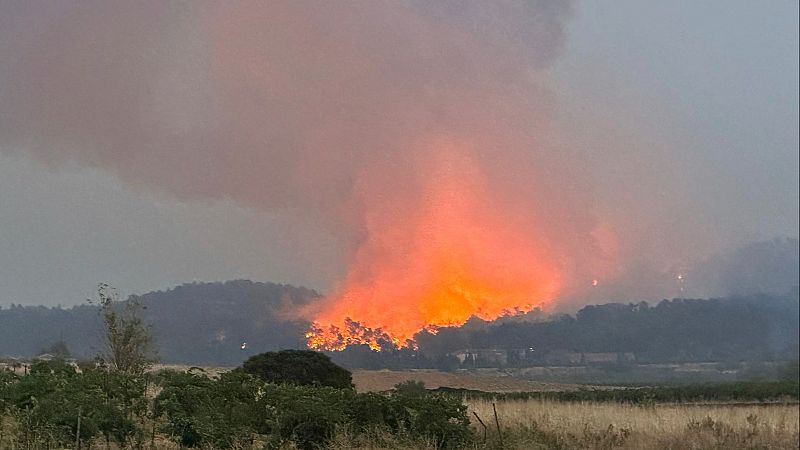France is burning. Here are 5 ways wildfires can hurt your health

A massive blaze is sweeping through the south of France, leaving more than 160 square kilometres burnt, property destroyed, and at least one death in its wake.
French authorities say the wildfire in the Aude region is the country’s biggest since 1949, with Prime Minister François Bayrou describing it as “catastrophe on an unprecedented scale”.
France is not alone. Greece, Portugal, Spain, Turkey, Romania, and the United Kingdom have also been grappling with fierce wildfires this summer.
Their toll goes far beyond the immediate destruction. Smoke and flames can cause high levels of air pollution, which is harmful to people’s health and can travel thousands of kilometres from the fire.
Wildfire smoke also appears to be more harmful than other types of air pollution when it comes to our health, though research on its long-term impact is limited.
Children, older adults, people with certain health issues, and outdoor workers are at higher risk of complications.
Even after they are contained, wildfires can affect people’s wellbeing by, for example, making it harder for them to access health care services.
Here are five ways wildfires can affect human health – and how you can protect yourself if wildfire smoke reaches you.
1. Respiratory irritation
Wildfire smoke is full of tiny air pollutants, including fine particulate matter or PM2.5. It can get deep into the lungs, triggering coughing fits, chest pain, and stinging eyes.
Exposure can also exacerbate asthma and has been linked to pneumonia.
2. Organ damage
Experts believe PM2.5 can enter the bloodstream, cause inflammation, and affect other parts of the body, including the heart. Smoke exposure has been tied to a higher risk of sudden cardiac arrest and heart attack.
Beyond the impact on our lungs and hearts, PM2.5 from wildfire smoke can cause and exacerbate problems with the skin, gut, kidney, eyes, nose, and liver, according to the World Health Organization (WHO).
3. Mental health issues
Wildfires can be traumatic. Victims are at higher risk of depression, insomnia, and post-traumatic stress disorder (PTSD), according to the European Environment Agency (EEA). The mental health impact can be either immediate or longer term.
Meanwhile, research published this week found that after devastating wildfires in the Hawaiian island of Maui in 2023, the rates of suicide and overdose deaths nearly doubled.
4. Brain performance
Wildfire smoke can lead to cognitive impairment and memory loss, the WHO said. In research published last year, the more people were exposed to wildfire pollutants over time, the more likely they were to be diagnosed with dementia.
In another study, researchers found adults had shorter attention spans within just a few hours of exposure to wildfire smoke pollution.
5. Cancer
Long-term exposure to wildfire smoke may raise the risk of lung cancer and brain tumours, though more research is needed on the topic.
A sweeping review in 2022, for example, found that PM2.5 and other chemicals often found in wildfire smoke were linked to cancer, based on studies that showed elevated cancer risks among firefighters and people in the western United States, where wildfires are common.
How can I protect myself from wildfire smoke?
If wildfire smoke reaches you, there are steps you can take to minimise its impact on your health.
In parts of France affected by the wildfires, local authorities are urging residents and tourists to stay in their homes unless they are told to evacuate.
Meanwhile IQAir, a Swiss company that tracks air quality, recommends that people shut their doors and windows, set their heating and cooling system to recirculate indoor air, and consider using an air purifier.
It says people should try to stay indoors and wear a KN95 mask if they need to leave the house.

